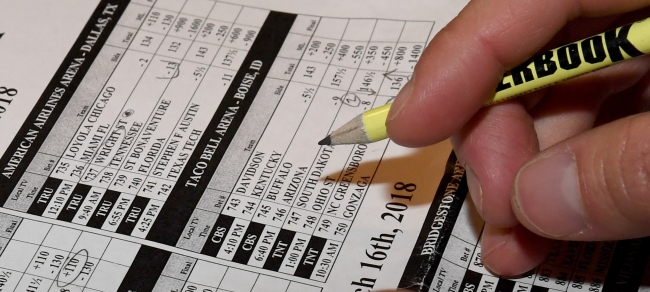You have /5 articles left.
Sign up for a free account or log in.

Getty Images
The U.S. Supreme Court on Monday struck down a law that had forbidden gambling on college and professional sports in most states, a decision that experts expect will create significant problems for the National Collegiate Athletic Association and an inconsistent patchwork of laws among the states.
The ruling is a loss for the NCAA and professional leagues, which had sought to block the challenge to the 1992 Professional and Amateur Sports Protection Act passed under the George H. W. Bush administration.
That federal law prohibited sports gambling in all states but Nevada. Former New Jersey governor Chris Christie, and his successor, Phil Murphy, had sought to undo it to help revive the state’s ailing casinos and racetracks.
The NCAA had argued that allowing bets on college sports would “undermine the integrity” of athletics and "jeopardize players' welfare." In a statement, the association said, “While we are still reviewing the decision to understand the overall implications to college sports, we will adjust sports wagering and championship policies to align with the direction from the court.''
Justice Samuel A. Alito Jr., writing for the court’s majority, opined that individual states had the right to legalize sports gambling and that Congress had overstepped by simply banning it, a “commandeering” of states’ sovereignty. The majority’s interpretation will likely fuel other campaigns around states rights’, such as the push to legalize marijuana in defiance of federal rules.
Despite the prohibition, the American Gaming Association estimated at least $150 billion circulates in sports gambling, almost all of it underground.
“Supporters argue that legalization will produce revenue for the states and critically weaken illegal sports betting operations, which are often run by organized crime. Opponents contend that legalizing sports gambling will hook the young on gambling, encourage people of modest means to squander their savings and earnings, and corrupt professional and college sports,” Alito wrote in his opinion. “The legalization of sports gambling requires an important policy choice, but the choice is not ours to make."
Justices Ruth Bader Ginsburg and Sonia Sotomayor dissented, and Justice Stephen G. Breyer agreed with them in part. Ginsburg wrote in her dissent that the court’s majority had wielded “an axe” to cut down the law when it could have simply used “a scalpel to trim the statute.”
“On no rational ground can it be concluded that Congress would have preferred no statute at all if it could not prohibit states from authorizing or licensing such schemes,” Ginsburg wrote.
Sports law experts and economists believe that the court’s ruling will result in a dash by many states, particularly those with existing infrastructure, to launch sports gambling in an attempt to grab at a new wellspring of cash.
Christie, who celebrated that states rights’ had won out on Twitter Monday, had predicted that casinos and racetracks would start taking bets quickly. One New Jersey track said it could do so in as little as two weeks.
The billionaire investor Mark Cuban bragged Monday that owners of top professional sports teams just saw the value of their teams double.
The NCAA, however, is right to be unnerved, experts said. Already, the association has been plagued by scandal and scorn, largely related to an alleged kickback deal around men’s basketball that federal officials uncovered. Adding more money to the system will only exacerbate the NCAA’s issues and likely cause more corruption, they said.
This would put new pressure on the NCAA, said Michael A. Olivas, the William B. Bates Distinguished Chair of Law at the University of Houston. It will need to pass new rules and teach fans about what is permissible in gambling, depending on the state.
“The stakes are going to be higher because the money is going to be greater,” Olivas said.
Players will likely start throwing games more under pressure from (or with incentives from) gambling interests, said Gil Fried, a former lawyer and professor of sports management at University of New Haven. While this kind of activity might be expected most at the high-profile Division I level, Fried said he thought it was much more likely in Divisions II and III, where investigators may not pay as much attention and athletes are less likely to reach the professional level and thus have less to lose, Fried said.
Such a scheme is not unheard-of -- a major scandal shook the New York basketball scene in the 1950s, and institutions such as Boston College and Tulane were affected in the 1980s. Basketball is particularly ripe for this type of manipulation, said Charles Clotfelter, professor of public policy, law and economics at Duke University.
The ruling is a “new specter at the NCAA’s door,” he said, adding that the association thrives off a “clean” image of young men and women competing not for wealth, as in the professional leagues, but for sportsmanship. Having gambling groups and shady characters hanging around locker rooms and stadiums does not benefit the NCAA, he said. Clotfelter said that this will be worsened by legalized gambling because states are giving people license to do so.
The association will likely try to lobby Congress to pass a bill to exempt it, Fried said. Republican senator Orrin Hatch of Utah, one of the original authors of the gambling law, said Monday he plans to introduce new legislation to “protect honesty and principle in the athletic arena,” but he offered no details of a plan.
The Knight Commission on Intercollegiate Athletics, which lobbies for academic reforms in college athletics, instead urged states to prohibit gambling on college and amateur sports.
“There should be a clear distinction between wagering on the outcomes of sport professionals and betting on students who compete for their college and high school sports teams,” the commission said in a statement.




